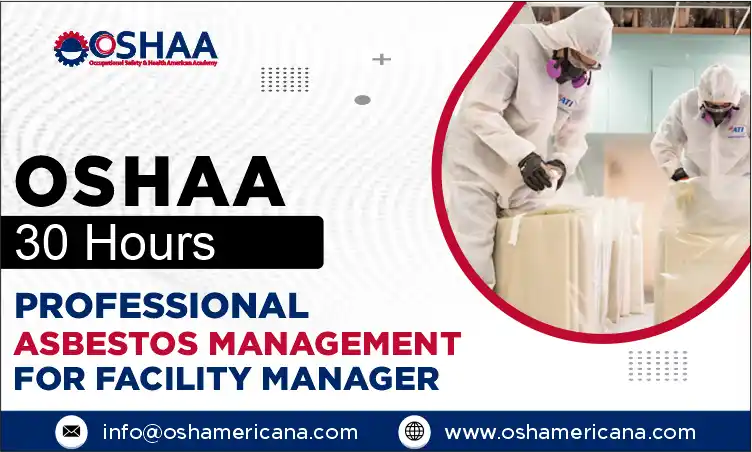Become an Asbestos-Safe Facility Manager with Professional Diploma
The OSHAA 30-Hours Professional Diploma in Asbestos Management for Facility Manager is a globally recognized training program designed to equip facility managers with the essential skills and knowledge required to handle asbestos-related risks. Asbestos remains a serious health hazard in many older buildings, and improper management can result in severe health consequences, costly legal issues, and operational disruptions. This professional diploma provides the comprehensive training necessary to ensure facility managers can effectively oversee asbestos compliance, safeguard occupants, and maintain workplace safety to the highest standards.
Through the OSHAA 30-Hours Professional Diploma in Asbestos Management for Facility Manager, participants gain advanced expertise in asbestos risk assessment, regulatory requirements, control strategies, and safe management practices. The course emphasizes not only the identification and monitoring of asbestos-containing materials but also the development of detailed asbestos management plans, emergency response procedures, and compliance with international occupational safety frameworks. Learners will understand the intersection of health regulations, building management, and worker protection, ensuring they are fully prepared to meet both legal and professional responsibilities.
This diploma also highlights the critical leadership role of facility managers. By completing the OSHAA 30-Hours Professional Diploma in Asbestos Management for Facility Manager, participants will be able to lead safety initiatives, train staff, manage contractors, and enforce compliance with confidence. The program’s practical and regulatory focus ensures that learners are not only prepared to manage asbestos safely but are also capable of creating long-term strategies that support organizational efficiency, risk reduction, and stakeholder trust.
Enrolling in the OSHAA 30-Hours Professional Diploma in Asbestos Management for Facility Manager allows professionals to strengthen their career opportunities while contributing to safer workplaces and compliant building operations. By mastering the dual priorities of asbestos safety and regulatory compliance, graduates of this program are equipped to protect public health, uphold legal obligations, and advance in the field of facility and safety management with credibility and confidence.
OSHAA 30-Hours Professional Diploma in Asbestos Management for Facility Manager
To enroll in the OSHAA 30-Hours Professional Diploma in Asbestos Management for Facility Manager, learners are expected to meet the following criteria:
1. Age Requirement
- Participants must be at least 18 years of age to register for the OSHAA 30-Hours Professional Diploma in Asbestos Management for Facility Manager.
- This minimum age ensures that learners have the maturity, responsibility, and professional readiness required to engage with advanced compliance, safety management, and asbestos-related regulatory content.
- Being of legal working age also enables participants to apply the knowledge gained in real workplace environments effectively.
2. Educational Background
- A minimum of a high school diploma or equivalent qualification is recommended for admission into the OSHAA 30-Hours Professional Diploma in Asbestos Management for Facility Manager.
- This educational foundation provides learners with the ability to understand technical concepts, regulatory frameworks, and safety management principles covered in the course.
- While not mandatory, higher education or prior studies in fields such as facility management, occupational health and safety, engineering, or environmental science offer a valuable advantage, enabling participants to apply course knowledge more effectively in professional contexts.
3. Work Experience
- Prior work experience is not a strict requirement to enroll in the OSHAA 30-Hours Professional Diploma in Asbestos Management for Facility Manager.
- However, professionals already working in facility management, health and safety, compliance, or construction will find the training especially beneficial in strengthening their skills and aligning workplace practices with asbestos safety regulations.
- For individuals new to the industry, the course provides a strong entry point by equipping them with essential knowledge and practical competencies to begin or advance their careers in safety and compliance management.
4. English Proficiency
- Learners must be able to read, write, and communicate effectively in English to fully benefit from the OSHAA 30-Hours Professional Diploma in Asbestos Management for Facility Manager.
- Proficiency in English is vital for understanding the technical terminology, safety protocols, and international asbestos management regulations presented in the course.
- Strong language skills also ensure participants can engage with assessments, interpret regulatory documentation, and confidently apply their learning in professional workplace scenarios.
By meeting these eligibility requirements, participants can maximize the value of the OSHAA 30-Hours Professional Diploma in Asbestos Management for Facility Manager, gaining the expertise, compliance knowledge, and leadership skills needed to manage asbestos risks effectively while advancing their professional careers.
Study Units
Learning Outcomes
The OSHAA 30-Hours Professional Diploma in Asbestos Management for Facility Manager is designed to equip learners with advanced competencies in asbestos safety, legal compliance, and facility management. The learning outcomes of this course focus on ensuring that participants acquire the knowledge, practical skills, and leadership abilities required to manage asbestos risks effectively while aligning with international occupational health and safety standards. By completing this program, learners will be prepared to integrate regulatory compliance with proactive management strategies, safeguarding both building occupants and workers.
Introduction to Asbestos and Its Health Risks (3 Hours)
- Develop a detailed understanding of asbestos, its common uses, and why it remains a significant workplace hazard
- Recognise short-term and long-term health risks, including asbestosis, mesothelioma, and lung cancer
- Explain the importance of awareness and early intervention in minimizing asbestos-related health impacts
- Apply fundamental knowledge of asbestos risks to real workplace scenarios in facility management
- Understand the role of facility managers in protecting workers and occupants
Legal and Regulatory Framework for Asbestos Management (4 Hours)
- Interpret key aspects of international asbestos legislation, including UK Control of Asbestos Regulations 2012 and OSHA guidelines
- Identify employer and facility manager responsibilities for compliance and worker safety
- Understand the legal, financial, and reputational risks of regulatory non-compliance
- Apply legal frameworks to design and implement effective asbestos management systems
- Recognise the importance of continuous compliance monitoring within facilities
Identifying and Assessing Asbestos Risks in Buildings (4 Hours)
- Gain skills to identify asbestos-containing materials (ACMs) in older buildings
- Conduct systematic risk assessments to determine likelihood of exposure in various environments
- Use professional tools and techniques for inspections and hazard detection
- Document findings in compliance with OSHA and international reporting standards
- Prioritise risks and recommend appropriate control measures
Developing an Asbestos Management Plan (4 Hours)
- Learn to design, implement, and maintain legally compliant asbestos management plans
- Incorporate strategies for risk monitoring, record-keeping, and communication with stakeholders
- Align management plans with international best practices and facility-specific operational needs
- Gain confidence in leading teams through structured asbestos safety procedures
- Ensure plans are actionable and effectively reduce exposure risks
Asbestos Control Measures and Safe Work Practices (5 Hours)
- Apply OSHA-approved control measures to minimise asbestos exposure
- Train staff in safe work practices, including proper use of PPE
- Develop systems for isolating, containing, and managing ACMs safely
- Implement monitoring protocols to ensure ongoing compliance with safety regulations
- Build an organizational culture around safe asbestos handling and worker protection
Managing Asbestos Removal Projects (4 Hours)
- Understand planning, coordination, and oversight responsibilities for asbestos removal
- Evaluate contractor qualifications, removal techniques, and compliance with regulations
- Monitor asbestos abatement operations to ensure adherence to international safety standards
- Lead project teams in executing removal strategies while minimising risks to workers and occupants
- Maintain accurate records to demonstrate compliance and accountability
Asbestos Waste Management and Disposal (3 Hours)
- Learn safe handling, packaging, and transportation methods for asbestos waste
- Understand regulatory requirements for disposal of asbestos materials
- Apply environmentally responsible waste management practices
- Establish facility-wide systems for proper waste segregation, labeling, and documentation
- Ensure compliance with both OSHA and international environmental standards
Health Surveillance and Worker Safety (3 Hours)
- Implement health surveillance programs for workers potentially exposed to asbestos
- Understand early detection methods for asbestos-related illnesses
- Develop systems to monitor worker well-being and report health concerns
- Promote proactive occupational health practices and continuous worker protection
- Reinforce the role of facility managers in fostering a culture of safety and compliance
By completing the OSHAA 30-Hours Professional Diploma in Asbestos Management for Facility Manager, participants will gain the expertise to manage asbestos risks effectively, ensuring compliance with OSHA and international safety standards. This course prepares facility managers to lead safety initiatives, implement comprehensive management systems, and foster a culture of compliance and accountability. Graduates of this program will be fully equipped to safeguard the health of workers and occupants while demonstrating professional excellence in asbestos management.
The OSHAA 30-Hours Professional Diploma in Asbestos Management for Facility Manager offers a wide range of professional benefits designed to enhance individual expertise, strengthen organizational compliance, and promote safer workplaces. This diploma provides facility managers with advanced knowledge of asbestos-related risks, compliance strategies, and practical management techniques. By completing this training, participants gain the ability to meet regulatory standards, protect worker health, and lead asbestos management programs with confidence and authority.
1. Enhanced Knowledge and Expertise
- Gain in-depth understanding of asbestos risks, including identification, assessment, and management.
- Learn how to apply asbestos management practices in a variety of facility environments.
- Develop technical skills to implement effective asbestos control measures.
2. Compliance with Legal and Regulatory Standards
- Understand OSHA requirements, the Control of Asbestos Regulations 2012, and global frameworks.
- Ensure facilities remain compliant with international standards and avoid legal violations.
- Apply best practices for regulatory documentation and audits.
3. Improved Health and Safety Protocols
- Develop asbestos management plans tailored to facility operations.
- Integrate safe work practices and worker health monitoring.
- Reduce the risk of exposure for both staff and building occupants.
4. Practical Application for Facility Managers
- Learn to coordinate asbestos removal projects from planning to completion.
- Manage contractors and oversee proper disposal of asbestos-containing materials.
- Apply practical strategies to everyday facility management challenges.
5. Risk Mitigation and Exposure Reduction
- Identify asbestos-containing materials accurately within buildings.
- Conduct structured asbestos risk assessments.
- Implement controls that minimize exposure risks and liabilities.
6. Cost-Effective Resource Management
- Prevent expensive asbestos-related incidents through proactive planning.
- Reduce repair and compliance costs with effective asbestos strategies.
- Optimize facility resources for long-term operational savings.
7. Professional Development and Career Advancement
- Strengthen professional credentials with an internationally recognized diploma.
- Increase competitiveness in health, safety, and facility management careers.
- Demonstrate commitment to maintaining high safety and compliance standards.
8. Tailored Learning for Facility Managers
- Access content specifically designed for facility management professionals.
- Gain solutions that directly apply to daily responsibilities.
- Build confidence in handling asbestos challenges unique to building operations.
9. Comprehensive and Well-Rounded Training
- Master asbestos risk assessment, waste management, and removal management.
- Develop knowledge of health surveillance and safe work practices.
- Gain a complete skill set aligned with OSHA and global standards.
10. Leadership in Safety Management
- Build skills to lead safety initiatives within organizations.
- Learn to implement asbestos policies and monitor compliance.
- Foster a proactive culture of health and safety among staff.
11. Worker Well-being and Productivity
- Protect staff from harmful asbestos exposure and related risks.
- Promote safer working environments that improve morale and performance.
- Reduce absenteeism through stronger safety protocols.
12. Emergency Preparedness and Response
- Learn to respond to asbestos-related emergencies quickly and effectively.
- Develop facility-level emergency and contingency plans.
- Minimize disruption while ensuring compliance in critical situations.
13. Organizational Reputation and Trust
- Strengthen stakeholder trust by demonstrating commitment to safety.
- Enhance organizational credibility through visible compliance efforts.
- Showcase leadership in asbestos management and workplace protection.
14. Continuous Improvement and Innovation
- Stay updated with evolving asbestos management strategies and technologies.
- Apply innovative methods to improve compliance and facility safety.
- Encourage long-term adaptability within the organization.
15. Global Relevance and Applicability
- Apply knowledge gained from the OSHAA 30-Hours Professional Diploma in Asbestos Management for Facility Manager across international contexts.
- Recognize the global health risks of asbestos and respond effectively.
- Position yourself as a professional capable of managing compliance anywhere in the world.
Completing the OSHAA 30-Hours Professional Diploma in Asbestos Management for Facility Manager prepares participants to lead asbestos safety programs, maintain compliance, and promote long-term safety and efficiency. This diploma provides not only professional growth but also ensures organizational resilience and global relevance.
The OSHAA 30-Hours Professional Diploma in Asbestos Management for Facility Manager delivers comprehensive professional benefits that extend across individual career development, organizational compliance, and global workplace safety standards. Designed specifically for facility managers and safety leaders, this diploma builds advanced knowledge of asbestos-related risks while equipping learners with the skills to develop, implement, and monitor effective management strategies. By completing the OSHAA 30-Hours Professional Diploma in Asbestos Management for Facility Manager, participants gain the ability to maintain legal compliance, protect worker health, and lead asbestos management programs confidently and professionally.
1. Enhanced Knowledge and Expertise
- Acquire a detailed understanding of asbestos health risks, identification techniques, and management strategies.
- Apply asbestos management practices in diverse facility settings.
- Develop practical competencies for implementing asbestos control measures as part of daily operations.
2. Compliance with Legal and Regulatory Standards
- Gain in-depth knowledge of OSHA requirements, the Control of Asbestos Regulations 2012, and other global frameworks.
- Ensure facilities remain compliant with international asbestos management standards.
- Build confidence in meeting audit and documentation requirements with precision.
3. Improved Health and Safety Protocols
- Design and implement asbestos management plans aligned with best practices.
- Integrate worker health monitoring and safe work procedures.
- Reduce risks of asbestos exposure for both employees and building occupants.
4. Practical Application for Facility Managers
- Learn to manage asbestos removal projects from planning through completion.
- Coordinate contractors while ensuring safe asbestos disposal and compliance.
- Apply solutions directly tailored to the daily responsibilities of facility managers.
5. Risk Mitigation and Exposure Reduction
- Conduct structured asbestos surveys and risk assessments.
- Identify asbestos-containing materials accurately within facilities.
- Implement proactive measures to minimize exposure and reduce organizational liability.
6. Cost-Effective Resource Management
- Reduce the likelihood of costly asbestos-related incidents through strategic planning.
- Optimize resources by balancing compliance requirements with operational efficiency.
- Secure long-term financial savings through proactive asbestos management approaches.
7. Professional Development and Career Advancement
- Earn an internationally recognized OSHAA certification that enhances employability.
- Demonstrate advanced skills in safety, compliance, and asbestos management.
- Increase competitiveness for leadership positions in facility management and occupational health.
8. Tailored Learning for Facility Managers
- Engage with training designed specifically for the role of facility managers.
- Gain industry-relevant solutions to real-world asbestos challenges.
- Strengthen capacity to address safety and compliance issues in building operations.
9. Comprehensive and Well-Rounded Training
- Master asbestos risk assessment, removal management, and waste disposal techniques.
- Gain expertise in health surveillance, safe work practices, and regulatory compliance.
- Build a versatile skill set that integrates OSHA standards with international regulations.
10. Leadership in Safety Management
- Develop the ability to lead safety initiatives within organizations.
- Implement and enforce asbestos policies that align with OSHA requirements.
- Foster a culture of safety and accountability across all levels of staff.
11. Worker Well-being and Productivity
- Protect workers from asbestos-related health hazards through proactive safety measures.
- Improve staff morale and job satisfaction by ensuring safe environments.
- Reduce absenteeism and enhance productivity through effective risk control.
12. Emergency Preparedness and Response
- Gain the ability to manage asbestos-related emergencies efficiently.
- Design facility-specific contingency and emergency plans.
- Ensure compliance and minimize disruption during critical incidents.
13. Organizational Reputation and Trust
- Strengthen trust among stakeholders by demonstrating commitment to asbestos safety.
- Enhance credibility with regulatory bodies through compliance and best practices.
- Position the organization as a leader in asbestos risk management.
14. Continuous Improvement and Innovation
- Promote a culture of continuous safety improvement across facilities.
- Adapt asbestos management strategies to evolving regulations and industry needs.
- Drive organizational excellence through innovation in compliance and safety practices.
The OSHAA 30-Hours Professional Diploma in Asbestos Management for Facility Manager provides participants with the tools, knowledge, and certification needed to advance their careers, safeguard their facilities, and build a strong safety culture. By completing this diploma, facility managers and safety professionals are equipped to lead confidently, ensure compliance, and achieve operational excellence in asbestos management on a global scale.







